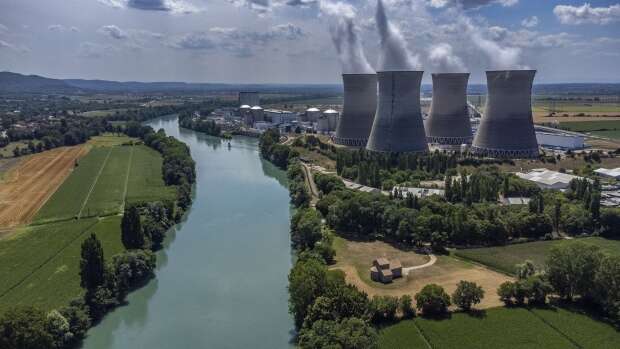France issued an ultimatum and Germany pushed back in an increasingly bitter standoff that lays bare the disruption unleashed by the combination of the region’s energy crisis and European Union’s green shift, according to Bloomberg.
While the dispute revolves around the role of nuclear in the bloc’s future energy mix, it’s ultimately about where Europe’s industrial heart is located. Even as prices eased from record highs seen last year, positions have hardened as France and Germany seek to avoid being left behind as the EU seeks to become carbon neutral.
Shaken by the so-called yellow vest protests in France five years ago, energy prices remain an explosive topic for President Emmanuel Macron’s government. Chancellor Olaf Scholz’s coalition in Germany also faces intense pressure after support tumbled following a messy reform this spring to shift household heating away from fossil fuels. Opposition parties in both countries are seizing on the issue.
The spat over energy prices is only one aspect in the tensions between the two countries. France and Germany have faced off over core elements of the Green Deal this year. First, Germany held up rules effectively banning new combustion-engine vehicles from 2035 over an exemption for so-called e-fuels. Then, France pushed for a similar carve-out for nuclear in a law on renewable energy.
France is seeking to gain an edge in a revamp of EU power-market rules in order to help prolong its aging and indebted fleet of reactors. Its plan would effectively allow the government to ensure more stability for state-controlled Electricite de France SA and to tap new financing sources to extend the life of its reactors.
The French utility is badly in need of funds. EDF has said it may have to invest €25 billion a year to extend the operations of 56 reactors dating from the 1980s and ‘90s, build new ones, add wind and solar capacity and upgrade grids. The problem is the energy giant is saddled with €65 billion in debt.
Berlin is blocking the initiative as Germany scrambles to rebuild its own energy system following the collapse of Russian gas supplies last year and completing a decade-long journey to shut its nuclear reactors earlier this year. Europe’s largest economy is concerned France will be in position to undercut German energy prices if Paris’s proposed regulation allows EDF to sell power at uneconomical costs.
“The point of disagreement is that the French energy infrastructure is state property,” German Economy Minister Robert Habeck said at an event in Rostock. He was responding to French counterpart Bruno Le Maire saying in an earlier public appearance that nuclear is a “red line” for the country.
Without reliable access to affordable power, Germany fears energy-intensive companies will invest elsewhere, and “we will lose this industrial base,” Habeck said. “My point is not that France has nuclear power plants; my point is that the operator of the nuclear power plants can offer cheap prices below market value.”
There is indeed cause for concern. With Germany’s energy costs still high and its supply security in doubt as the country exits coal too, France has attracted almost 50% more foreign direct investment projects than Germany over the past two years.
In an effort to respond, Habeck has proposed temporarily subsidizing industrial power prices, but is struggling to gain widespread backing. The plan risks continuing state support of inefficient producers and slowing the much-needed transition to clean energy, according to Claudia Kemfert, an energy expert at the German Institute of Economic Research in Berlin.
The pressure is mounting in Paris as a domestic law that obliges EDF to sell large volumes of power at a deep discount to current wholesale prices expires at the end of 2025.
A senior French government adviser argues that, under the new regulation that should be soon presented, future power costs in France would end up being close to those in Germany and that both nations are likely to agree on similar electricity price targets for their industries.


